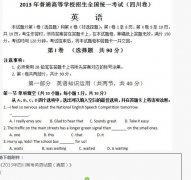2006-2013年高考英语四川卷(18)
29. A. promised B. admitted C. wondered D. discovered
30. A. a mistake B. a decision C. an attempt D. an effort
31. A. free B. different C. full D. happy
32. A. managed B. recognized C. allowed D. reduced
33. A. important B. attractive C. practical D. interesting
34. A. offered B. served C. controlled D. taught
35. A. realized B. apologized C. imagined D. explained
第二部分 阅读理解(共20小题:每小题2.5分,满分50分)
A
The meaning of the word “volunteer” may be a little different in different countries, but it usually means “one who offers his or her services.” There are many different ways in which people can volunteer, such as taking care of sick people, working in homes for homeless children, and picking up garbage(垃圾) from beaches and parks. Volunteers may work within their own countries or in other countries. They are often people with a strong wish to help those who are less fortunate than themselves. Volunteers don’t expect any kind of pay.
At the root of volunteering is the idea that one person may have the ability to offer services that can help other people. Tracy, a good friend of mine, however, recently came back from India with a new idea of what being a volunteer means. She worked for two and a half weeks in one of Mother Teresa’s homes in Calcutta. The following is her story.
“I first heard about Mother Teresa in my high school, we watched a video(录像) about her work in India and all over the world. I was so moved by her spirit to help others and her endless love for every human being that after I graduated from high school, I too wanted to try her kind of work. So with two friends I flew to Calcutta for a few weeks.”
“I was asked to work in a home for sick people. I helped wash clothes and sheets, and pass out lunch. I also fed the people who were too weak to feed themselves and tried to cheer them up. I felt it was better to share with them than to think that I have helped them. To be honest, I don’t think I was helping very much. It was then that I realized that I had not really come to help, but to learn about and experience another culture(文化) that helped improve my own understanding of life and the world.”
36. According to the text, a volunteer refers to a person who ______.
A. is willing to help those in need without pay B. can afford to travel to different places
C. has a strong wish to be successful D. has made a big fortune in life
37. Tracy started her work as a volunteer _______.
A. after she met Mother Teresa B. after she finished high school
C. when she was touring Calcutta D. when she was working in a hospital
38. Why did Tracy choose to be a volunteer?
A. She liked to work with Mother Teresa. B. She had already had some experience.
C. She was asked by Mother Teresa’s example. D. She wanted to follow Mother Teresa’s example.
39. What is Tracy’s “new idea” (Paragraph 2) of being a volunteer?
A. Going abroad to help the sick. B. Working in Mother Teresa’s home.
C. Doing simple things to help the poor. D. Improving oneself through helping others.
B
As nanny (保姆), cook, cleaner, shopper, driver, and gardener, she has one of the most demanding jobs in Britain today. And paying someone else to do the chores (家务活) which take the average housewife 71 hours a week would cost €349.
At over €18,000 a year that’s more than the earnings of 70 percent of the population, including train drivers, firemen, prison officers, and social workers. Looking after a baby less than a year old takes a housewife into a even higher pay league. According to a study, she earns €457 a week – at nearly €24,000 a year, the same as teachers, engineers, and chemists.
Researchers put a price on each chore, then tried to find out how long the average person takes doing them. They found housewives spend an average 70.7 hours a week on housework – with looking after the children (17.9hours) and cooking and cleaning (12.9 hours each) the most time-consuming (费时).
A wife with a part-time job still works an average of 59 hours a week at home. Those in full-time employment put in longer hours at home than in the workplace. The good news is that these hours drop sharply as children get older. While the average mother with a child under one puts in 90 hours weekly, the figure drops to 80 hours from one to four and to 66 hours from five to ten.
Mother-of-four Karen Williams from London said, “Paying the housewives may not be practical, but the government should recognize the value of housework, perhaps through the tax. Running a house takes a lot of time and most husbands don’t understand this. For example, my husband only puts a shelf up now and again. He never cleans the kitchen – that’s the real test.”




